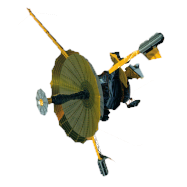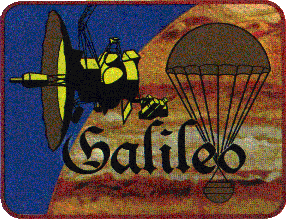Investigation of the Magnetosphere of Ganymede with Galileo's Energetic Particle Detector
Ph.D. dissertation by Shawn M. Stone, University of Kansas,
1999.
Copyright 1999 by Shawn M. Stone. Used with permission.
6.4 Outbound Results
The outbound portion of the G2 encounter encompasses the time interval between 19:05:00 and 19:25:00 UT. Figures 6.104 and 6.105 show field line tracings for three absorption features for model M1 and model M2 respectively. The features considered during this phase of the encounter are G2-19:08:51 (anti-moon loss cone) and G2-19:10:51, a loss cone feature. These two features represent the characteristics of all the features during this region. It is in this region where the difference in model becomes important in the reproduction of the absorption features. Not all energy channels for these two features are presented in Chapter 6. Table 6.13 gives information and some details on the plots not shown here which are included in Appendix C.
 |
Figure 6.104 Model 1 outbound field line tracings. The time in UT is indicated at each feature location. |
 |
Figure 6.105 Model 2 outbound field line tracings. The time in UT is indicated at each feature location. |
Next: Chapter 7 Corotational and Parallel Electric Fields: G2 Encounter
Return to dissertation table of contents page.
Return to main
Galileo Table of Contents Page.
Return to Fundamental
Technologies Home Page.
Updated 8/23/19, Cameron Crane
QUICK FACTS
Mission Duration: Galileo was planned to have a mission duration of around 8 years, but was kept in operation for 13 years, 11 months, and 3 days, until it was destroyed in a controlled impact with Jupiter on September 21, 2003.
Destination: Galileo's destination was Jupiter and its moons, which it orbitted for 7 years, 9 months, and 13 days.



